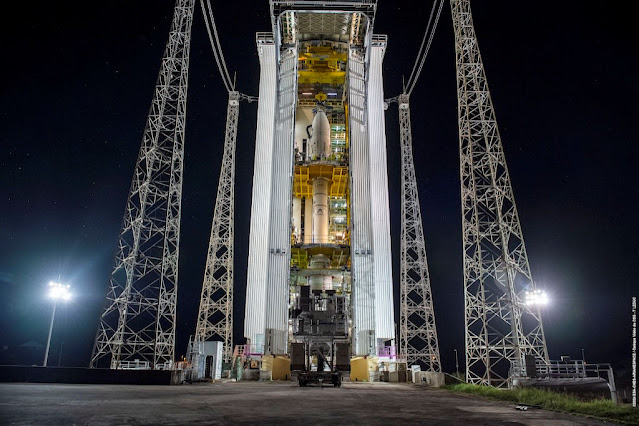Tonight (Tuesday night, Sept. 3) was to be the final launch of the ESA's first-generation Vega rocket, essentially opening the way for the next generation Vega-C to take its place. That launch was scrubbed for tonight due to "electrical issues" and rescheduled for tomorrow night, according to a 6:41 PM EDT announcement from the ESA. The mission, dubbed VV24, will carry an Earth-imaging satellite to a sun-synchronous orbit.
“Due to electrical issues on the ground links #VV24 launch chronology was interrupted,” Arianespace wrote on X, formerly Twitter. “Checks are being conducted to confirm a new launch attempt tomorrow, Sept. 4, at 10:50 p.m. local time in Kourou. The launcher and its passenger, Sentinel-2C, are in stable and safe conditions.”
The launch is now set for Wednesday, Sept. 4, at 10:50 PM local, or 9:50 p.m. EDT (0150 UTC) from Europe’s Spaceport in Kourou, French Guiana.
The imaging satellite is called the Copernicus Sentinel-2C satellite, and it will be deployed from the launcher about 57 minutes and 20 seconds after liftoff. Officials expect to acquire signal from the spacecraft within 12 minutes of separation.
“We are really delighted to start the Vega year with the European Union’s flagship program, Copernicus, enhancing life on Earth,” said Stéphane Israël, the CEO of Arianespace, the company which manages the Vega rocket. “This mission really highlights Arianespace’s commitment to space for better life on Earth.”
Israël said the launch campaign, which formally began on July 12, has been “running perfectly well”. He said that the spacecraft began fueling on Aug. 16 and it was integrated with the upper stage on Aug. 27.
The Vega rocket went into service back in 2012 and has launched 21 times since then. The goal was to have a smooth, overlapping transition from Vega to the Vega-C rocket, but an upper-stage issue during the second flight of Vega-C in late 2022 (middle piece in that Christmas-y post) scuttled that plan.
Sentinel-2 in the Vega launch tower. Image credit: ESA-CNES-ARIANESPACE/Optique vidéo du CSG–T. Leduc
The source article has a lot of information on the satellite program they're adding to with this launch. By all means read around if you're interested. Conceptually, the two-satellite constellation is similar in mission goals to NASA’s Landsat program and the French Satellite pour l’Observation de la Terre (SPOT) satellite series, which have been in operation since 1972 and 1986 respectively.
My interest is I'd like to see Europe get its launch capacity back. SpaceX has been launching payloads for EU, including two Galileo satellites on Monday evening from SLC-40 on Cape Canaveral. Buying the launches from SpaceX is better than those satellites never getting used, but having their own launch capability is something the EU used to do. Besides, maybe if the EU says members can't use those cheaper, reused boosters, maybe the people will stand up to the leaders and Space 2.0 will get even bigger and stronger.

No comments:
Post a Comment